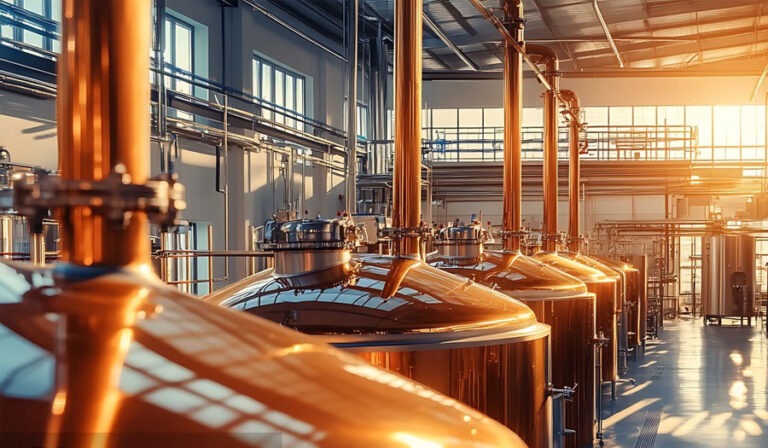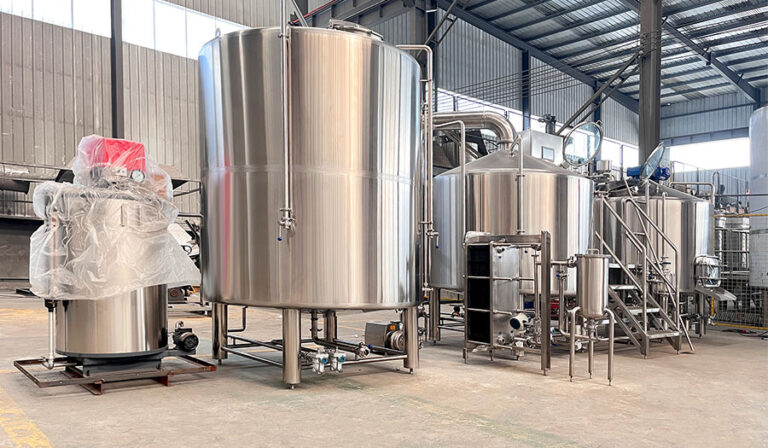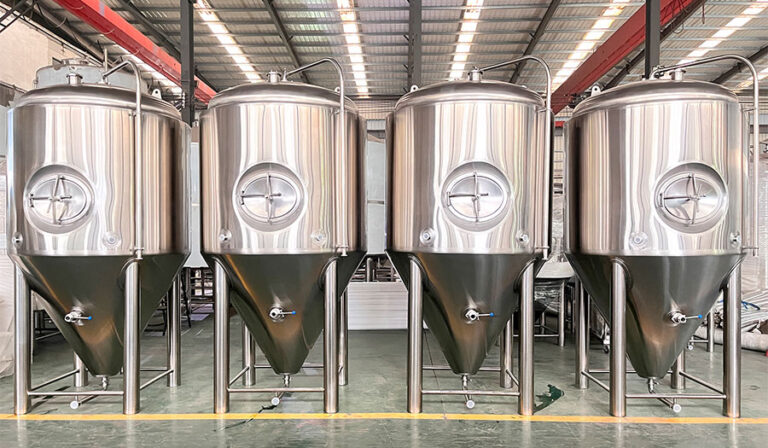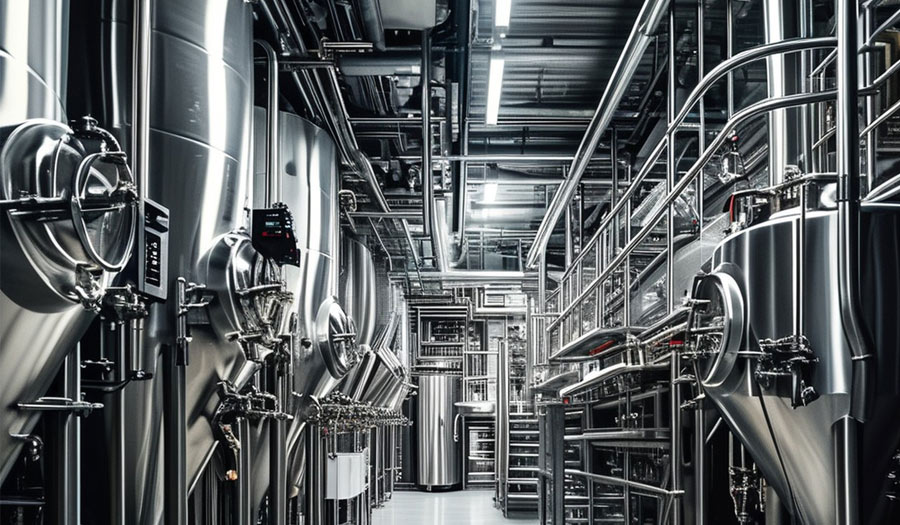In the modern beer industry, professional brewing systems are the basis for ensuring high quality, stable production, and efficient operation. Whether it is a small craft brewery or large-scale commercial production, the design of the brewing system and the selection of equipment directly affect the taste, flavor, and production efficiency of the beer. This article will explore the various aspects of the beer brewing system in depth to help brewers have a more comprehensive understanding of the professional brewing system.
Composition of the beer brewing system
The brewing process of beer is a multi-step biochemical reaction process, which usually includes raw material preparation, mash, fermentation, filtration, packaging, and other links. Each link requires special equipment to ensure efficient and precise task completion. Therefore, a professional brewing system usually consists of multiple core parts:
- Raw material storage and handling system
- mash system
- Boiling system
- Fermentation system
- Filtration and clarification system
- Packaging system

Functions and Roles of Professional Brewing Equipment
Raw Material Storage and Handling Equipment
The main raw materials of beer are water, malt, hops, and yeast. Each raw material is crucial in the brewing process, so appropriate equipment must be used to store and handle it.
- Malt warehouse: Malt is the core raw material in beer brewing. The malt warehouse mainly stores processed malt to ensure that it remains dry and fresh before use.
- Malt grinder: The malt grinder grinds the malt to increase its surface area, which is convenient for the enzyme action in the subsequent mash The degree of crushing affects the mashefficiency, so the equipment must accurately adjust the degree of crushing.
Mash system
Mash is one of the key steps in the beer brewing process. Through mash, the starch in the malt is converted into fermentable sugars to provide energy for the fermentation process.
- Mashpot: The mash pot usually consists of multiple functional areas, including a heating area, a heat preservation area, and a stirring area. In this equipment, the crushed malt is mixed with water, and the enzyme action is activated by controlling the temperature and pH value to convert starch into sugar.
- Filter: After the mashprocess, the malt residue is separated from the sugar solution. The filter is usually used to remove the solid malt residue and extract the clear wort to ensure the clarity and stability of subsequent brewing.
Boiling system
Boiling is an important step in the beer brewing process. It can kill bacteria, improve the stability of the wort, and add aroma and bitterness by adding hops.
- Boiling pot: The boiling pot needs to have a precise temperature control system to ensure that the wort can be boiled at a suitable temperature for a certain period. Different boiling times, temperature, and timing of adding hops directly affect the flavor and aroma of beer.
- Hop addition system: The addition of hops is crucial, which not only determines the bitterness of beer but also gives it a unique aroma. The addition system usually includes an automated dosing device to ensure that the hops are accurately placed in the boiling pot.
Fermentation system
The fermentation process is one of the key steps in beer brewing. During this process, yeast converts sugars into alcohol and carbon dioxide to produce the main components and taste characteristics of beer.
- Fermentation tank: The fermentation tank is the core equipment in the brewing process and usually has a strict temperature control and pressure control system. It can be divided into a primary fermentation tank and a secondary fermentation tank, the former is used for main fermentation, and the latter is used for maturation and further flavor development.
- Fermentation monitoring system: Modern fermentation monitoring systems can monitor parameters such as temperature, pressure, sugar, and alcohol content in real-time during the fermentation process. Data recording and automatic adjustment can help brewers optimize fermentation conditions and improve yield and quality.

Filtration and clarification system
The filtration and clarification process aims to remove suspended matter, yeast residues, and other solid matter in the fermentation liquid to make the beer clear and stable.
- Pressure filter: Pressure filters separate yeast and solid matter from liquid under high pressure. These devices usually use different filter membranes or filter cloths to ensure a fine and thorough separation effect.
- Centrifuge: Centrifuge uses centrifugal force to separate solid matter from liquid, usually used to remove yeast precipitation and fine particles, further improving the clarity of beer.
- Activated carbon filter: Sometimes, activated carbon filters are also used to remove odors or impurities in beer. It removes bad smells and substances from liquids by adsorption.
Packaging system
Finally, the fermented, filtered, and clarified beer will enter the packaging stage. The efficiency and accuracy of the packaging system are crucial to maintaining the quality of beer. Bottles or cans are the final form of beer entering the market. Modern packaging lines usually have the functions of automated filling, sealing, labeling, and packaging to ensure that the product is not contaminated by the outside world and can be put on the market with uniform standards.
Importance of Professional Brewing Equipment
Efficiency and Productivity
High-quality brewing equipment not only improves the quality of your beer, but also the overall efficiency of the brewing process. Advanced systems will streamline every stage from mashing and boiling to fermentation and packaging. Efficient equipment reduces the risk of production errors, minimizes downtime, and allows for large batches to be produced without compromising quality. This efficiency benefits commercial breweries that seek to meet high demand while maintaining a standard of excellence.
Durability and Lifespan
Investing in high-quality brewing equipment is a great long-term investment because it is built to last. Top-quality equipment uses sturdy materials such as stainless steel, which resists corrosion and wear. This durability ensures that the equipment can withstand the rigors of frequent use and does not require frequent repairs or replacements. Reduced maintenance and extended equipment life can result in significant cost savings, resulting in a better return on investment for brewers.
Enhanced Flavor and Aroma
Brewery equipment has a direct impact on the flavor and aroma of the final product. High-quality equipment gives you greater control over the brewing environment. Reliable yeast storage tanks with precise temperature control ensure that the yeast remains in optimal condition, helping to achieve the desired fermentation characteristics. Quality equipment helps avoid contamination and off-flavors, resulting in better-tasting, purer, more refined beer.
Consistency and Quality Control
One of the most notable benefits of high-quality beer brewing equipment is the ability to maintain consistent quality from batch to batch. Precisely controlled brew kettles, fermenters, and filtration systems ensure consistent, specific temperatures and conditions. This precision helps maintain the taste, aroma, and overall quality of your beer. Consistency is critical to customer satisfaction and brand reputation.
Safety and Compliance
High-quality brewing equipment has safety features that minimize the risk of accidents and ensure compliance with industry standards. Quality equipment often comes with certifications and adheres to strict regulatory requirements to protect you and your consumers. Safe equipment creates a healthier work environment, reduces liability risks, and ensures that the end product meets all safety standards.

FAQ
What is a professional brewing system?
A professional brewing system refers to a complete set of equipment and technology systems used to produce beer, covering the entire process from raw material processing, mash, boiling, fermentation, filtration, clarification to final packaging. An efficient brewing system can ensure the stability of beer quality while improving production efficiency, reducing energy consumption and waste.
What maintenance is required for professional beer brewing equipment?
Routine maintenance includes regular cleaning after each batch of products, checking the wear of valves and seals, and regular inspection of electrical and electronic components. Equipment manufacturers usually provide detailed maintenance procedures.
Why does beer need to be filtered after fermentation?
The filtration process is mainly to remove yeast residues, suspended matter and other solids. This process can improve the clarity, stability and taste of beer.
Why does beer need secondary fermentation after fermentation?
Secondary fermentation is usually used to help beer mature further and enhance its flavor. After the initial fermentation, the yeast and other microorganisms in the beer continue to produce flavor substances.
Can custom-sized brewing equipment be obtained?
Yes, Micet Group offers custom solutions for specific space requirements and brewing needs. When requesting a custom solution, please be sure to provide precise measurements and specifications.




